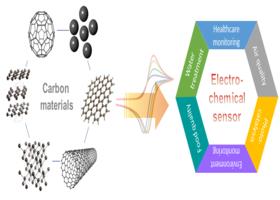- 3.4Impact Factor
- 4.9CiteScore
- 30 daysTime to First Decision
Carbon Materials for Electrochemical Sensors
Special Issue Information
Dear Colleagues,
The demand for inexpensive and handy healthcare and environmental monitoring systems is growing with the expansion in the world population. Therefore, there is a need for more cost-effective and efficient technologies for sensors for healthcare and environmental monitoring purposes. The development of carbon nanostructured materials has seen incredible scientific growth in the field of bio, chemical, electrochemical, and mechanical sensors. These nanostructured carbon materials possess unique characteristics, such as superior electrical conductivity, tunable porosity, outstanding mechanical strength, and remarkable thermal, optical, and chemical properties due to their nanosized and very high surface-area-to-volume ratio. These exceptional micro-/nanostructure-dependent characteristics of carbon nanomaterials help them to interact with other materials for numerous innovative applications, including electrochemical sensing.
This Special Issue intends to present insights into the role of micro-/nanoscale properties in improving the functional properties of carbon nanomaterials and their composites, such as amorphous and graphitic carbon, carbon nanofibers, nanotubes, and graphene, and composites with metal and metal oxides. For this Special Issue on carbon materials for energy and sensing applications, we are inviting submissions of original research and review articles that address such matters.
Dr. Kunal Mondal
Dr. Monsur Islam
Guest Editors
Manuscript Submission Information
Manuscripts should be submitted online at www.mdpi.com by registering and logging in to this website. Once you are registered, click here to go to the submission form. Manuscripts can be submitted until the deadline. All submissions that pass pre-check are peer-reviewed. Accepted papers will be published continuously in the journal (as soon as accepted) and will be listed together on the special issue website. Research articles, review articles as well as short communications are invited. For planned papers, a title and short abstract (about 250 words) can be sent to the Editorial Office for assessment.
Submitted manuscripts should not have been published previously, nor be under consideration for publication elsewhere (except conference proceedings papers). All manuscripts are thoroughly refereed through a single-blind peer-review process. A guide for authors and other relevant information for submission of manuscripts is available on the Instructions for Authors page. ChemEngineering is an international peer-reviewed open access semimonthly journal published by MDPI.
Please visit the Instructions for Authors page before submitting a manuscript. The Article Processing Charge (APC) for publication in this open access journal is 1600 CHF (Swiss Francs). Submitted papers should be well formatted and use good English. Authors may use MDPI's English editing service prior to publication or during author revisions.
Keywords
- graphene
- diamond
- polymers
- carbon-containing compounds
- electrochemical sensors
- gas sensing
- physical sensors
- readout electronics

Benefits of Publishing in a Special Issue
- Ease of navigation: Grouping papers by topic helps scholars navigate broad scope journals more efficiently.
- Greater discoverability: Special Issues support the reach and impact of scientific research. Articles in Special Issues are more discoverable and cited more frequently.
- Expansion of research network: Special Issues facilitate connections among authors, fostering scientific collaborations.
- External promotion: Articles in Special Issues are often promoted through the journal's social media, increasing their visibility.
- e-Book format: Special Issues with more than 10 articles can be published as dedicated e-books, ensuring wide and rapid dissemination.

